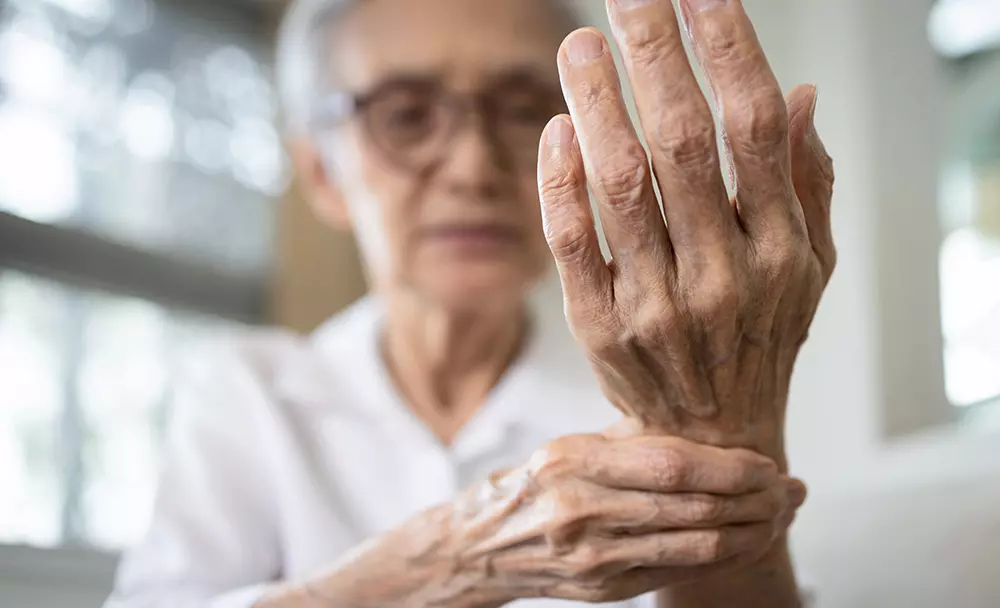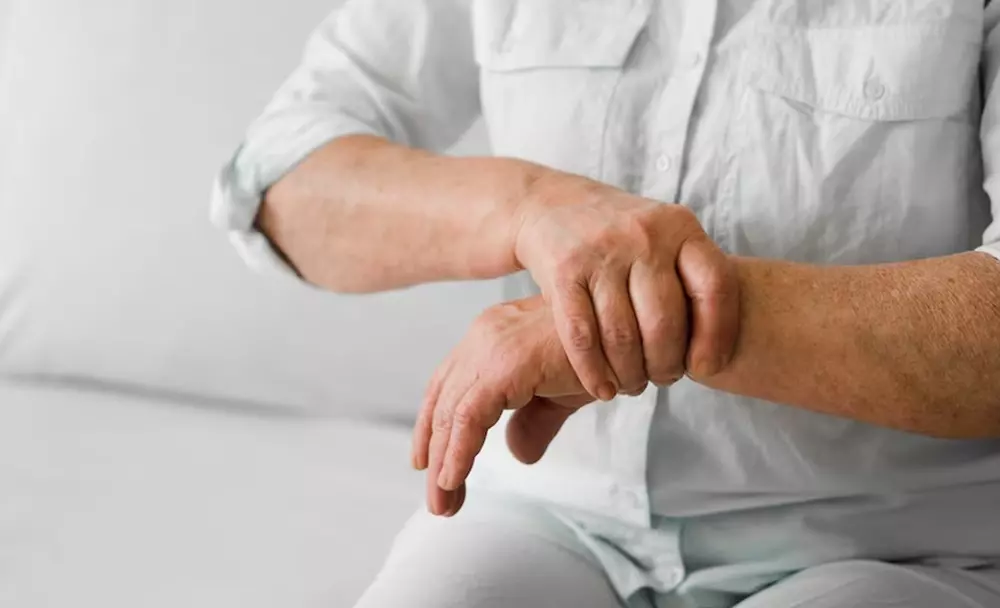
Are you suffering from osteoarthritis? If yes, then this article is for you.
Find everything you need to know about osteoarthritis and its treatment in Ayurveda along with tips to prevent the disease.
What Is Osteoarthritis? (1)
Osteoarthritis is a chronic degenerative condition caused by damage to the joint’s cartilage, leading to pain and restricted movement.
It can vary from mild to severe and typically affects middle-aged and elderly individuals, particularly those with knee, hip, back, feet, and weight-bearing joint problems.
Knee osteoarthritis is the most common form of this condition, contributing to almost 80% of the total osteoarthritis burden in India.
Causes of Osteoarthritis (1)
Common causative factors of osteoarthritis include:
- Consumption of dry, cold, or stale food
- Irregular sleeping habits
- Suppression of natural urges
- Exposure to severe cold and dry weather
- Degeneration of cartilage due to ageing
- Excessive strain on the joint
- Joint injury

Symptoms of Osteoarthritis (1)
Common signs and symptoms of osteoarthritis include:
- Moderate to severe pain at the affected joint
- Joint stiffness after prolonged rest
- Restricted and painful joint movements
- Crepitation (crunching or crackling noise)
- Localised tenderness in severe cases
- Swelling
- Increased local temperature at the affected site
Diagnosis of Osteoarthritis (1)
X-rays are generally used to diagnose osteoarthritis. They help show damage and other changes related to osteoarthritis.
Ayurvedic Perspective of Osteoarthritis (1)
In Ayurveda, a medical condition similar to osteoarthritis exists by the name ‘Sandhigata Vata’.
This condition is caused by a disturbance in the Vata Dosha, which affects the joints and results in the destruction of cartilage and a decrease in synovial fluid, leading to painful swelling and restricted movement.
Ayurvedic therapies for osteoarthritis focus on halting further damage to the joints and repairing damaged cartilage. Herbal remedies that alleviate Vata dosha are usually recommended to lubricate and strengthen the joints.
Ayurvedic Herbs To Treat Osteoarthritis (1)
Single-Use Herbs: Shunthi, Eranda Mula, Nirgundi, and Guggulu are some of the most beneficial herbs in Ayurveda for osteoarthritis.
Compound Formulations: Maharasnadi Kwath, Dashamula Kwath, Rasnadi Kwath, Maha Yogaraja Guggulu, Yogaraja Guggulu, Guggulu Tikta Ghrita, and Panchatikta Ghrita Guggulu are usually used by doctors in the treatment of osteoarthritis.
Herbal Oils: Mahanarayana Taila, Vishagarbha Taila, Narayana Taila, Mahamasha Taila, and Saindhavadi Taila are considered highly beneficial for treating osteoarthritis.
Note: It is recommended to use these herbs, formulations and herbal oils only after consulting an Ayurvedic doctor.
Ayurvedic Therapies for Osteoarthritis (2)
Apart from these herbs, formulations and herbal oils, Ayurvedic doctors also often prescribe Ayurvedic therapies to eliminate toxins from the body.
According to Ayurveda, diet plays an important role. Therefore, the therapeutic treatment of osteoarthritis in Ayurveda usually starts with Deepan Pachan to correct the metabolism and provide nourishment to the body. It, then, generally includes Janu Basti or Basti, as recommended by the doctor to pacify Vata Dosha and remove toxins. Janu Basti is usually followed by Swedana and then finally Panchakarma.
Abhyanga, or herbal oil massage, also plays a key role in treating osteoarthritis. It helps pacify the aggravated Vata Dosha, stimulate blood circulation and remove toxins from the body.
How To Prevent Osteoarthritis? (1)
You can reduce the risk of developing osteoarthritis by following these tips:
- Maintain a healthy diet
- Practice yoga and maintain a physically active lifestyle
- Maintain an optimal weight
- Avoid excessive repetitive motions
- Avoid long fasting
- Limit consumption of excessive heavy food
- Don’t stay awake at night
- Avoid suppressing natural urges
- Manage stress
- Do not stand for a prolonged time
- Avoid overexertion and joint injuries
On a Final Note
Osteoarthritis is a chronic degenerative condition that usually affects the knee joint. Its prevalence is increasing rapidly, especially among the elderly population.
Ayurveda offers an effective and safe approach to the management of osteoarthritis, focusing on preventing further damage to the joints and repairing the damaged cartilage.
Ayurvedic therapies usually include the use of single-use herbs, compound formulations and herbal oils, along with Samshodhana Chikitsa for treating osteoarthritis.
Taking the help of Ayurveda can not only help you manage osteoarthritis but also improve the quality of your life and prevent further deterioration of joints. However, remember to always consult an Ayurvedic practitioner before using any herb or remedy.
Disclaimer: The information provided in this article is for general awareness and not meant to substitute any medical advice. Please consult an Ayurvedic healthcare professional for medical advice.
References
- http://ccras.nic.in/sites/default/files/viewpdf/faq/OESTEOARTHRITIS.pdf
- http://www.iamj.in/current_issue/images/upload/212_218_1.pdf

















